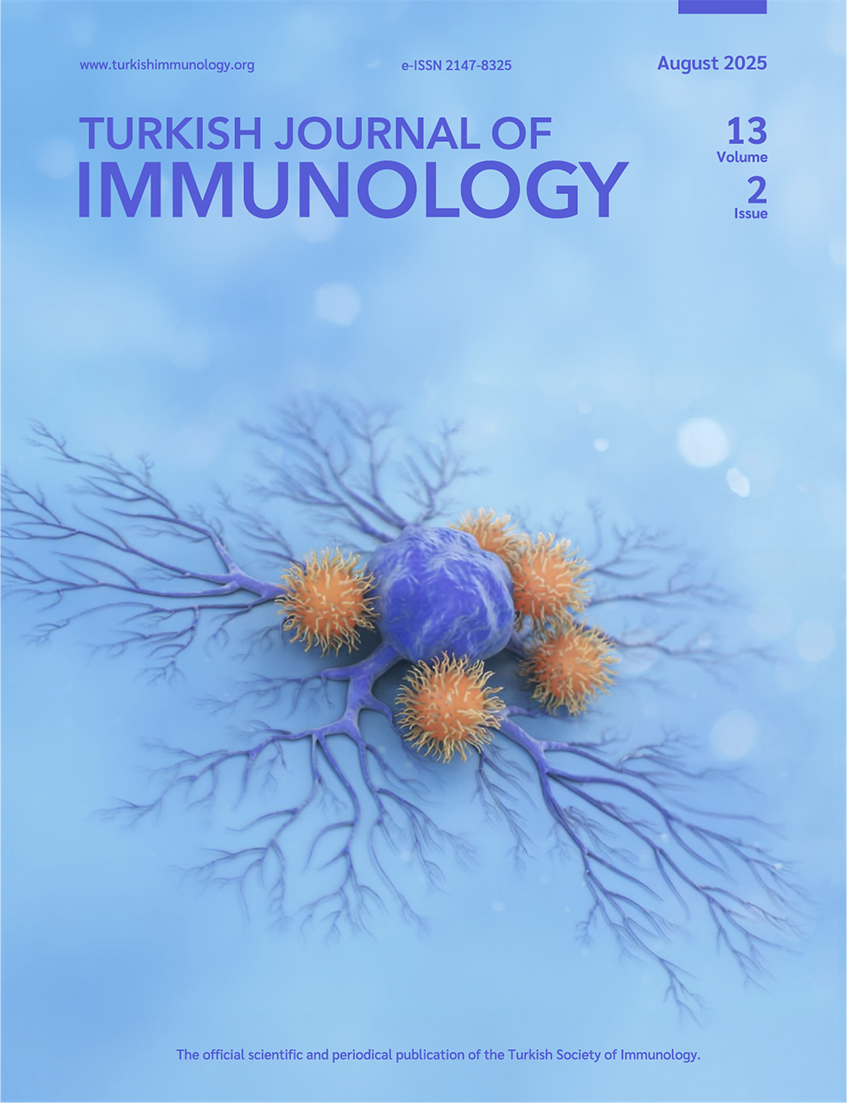Editorial
Interdisciplinary Perspectives in Immunology: Highlights from the August Issue
Günnur Deniz
This issue includes a comprehensive review article titled “Non-infectious gastrointestinal tract complications in patients with common variable immunodeficiency disorders: clinical perspectives, immunologic insights and therapeutic approaches.” This work provides valuable clinical perspectives, immunological explanations, and therapeutic (...)
Review Article
Non-Infectious Gastrointestinal Tract Complications in Patients with Common Variable Immunodeficiency Disorders: Clinical Perspectives, Immunologic Insights and Therapeutic Approaches
Semra Demir
Inborn errors of immunity (IEI), formerly known as primary immunodeficiency (PID), represent a diverse group of disorders, marked by varying levels of immunodeficiency and immune dysregulation. Although the prevalence varies by specific disease, the overall estimated prevalence is approximately 1/1200, likely lower than the true rate due to underdiagnosis. Among IEIs, predominantly antibody deficiencies (PADs), especially selective IgA deficiency and (...)
and others
Original Research
Relationship Between CD73 Expression on T Cells and Response to Treatment in De-novo Adult Acute Myeloid Leukemia Patients in Egypt
Eman Ibrahim Aly Mahmoud
Acute myeloid leukemia (AML) is the most common form of acute leukemia in adults, with an estimated 20,380 new cases and 11,310 deaths reported in the USA in 2023 alone. According to the National Cancer Institute, only 31.7% survive beyond five years post-therapy. Treatment of patients with AML consists of three phases: induction, consolidation, and maintenance. The induction phase, as outlined by the National Comprehensive Cancer Network (NCCN), typically involves (...)
and others
Investigation of Immunoblot Results of Antinuclear Antibody Test Positive Patients with Systemic Autoimmune Rheumatic Diseases
Emrah Salman
Autoantibodies seen in systemic autoimmune rheumatic diseases (SARDs) generally target nuclear antigens and are known as antinuclear antibodies (ANAs). Antinuclear antibody-associated rheumatic diseases encompass a diverse range of conditions characterized by the presence of (...)
Immunogenic Potential of Foot and Mouth Virus Antigen O-146S Adjuvanted with Water-in-Oil and Water-in-Oil-in-Water Emulsion in Mice
Karrar Ali Mohammed Hasan Alsakini
and Ayşe Nalbantsoy
Foot-and-mouth disease (FMD) is a highly contagious and potentially fatal animal disease, according to the World Organization for Animal Health (WOAH), that primarily affects cloven-hoofed animals. The causative agent, foot-and-mouth disease virus (FMDV), is a member of the Picornaviridae family and belongs to the genus Aphthovirus. The symptoms of the disease include a sudden onset of fever and lesions on the mouth and the feet. The spread of FMD (...)
Efficacy of the Thymus Polypeptide Fraction Biomodulina T in Children with Thymic Hypoplasia and Recurrent Infections
Odalis María de la Guardia Peña
The thymus is a primary lymphoid organ essential for the development and maturation of immunocompetent T cells. Its size decreases progressively throughout life, with involution typically beginning after puberty. Both genetic and environmental factors regulate thymic development. Thymic hypoplasia (TH) and aplasia refer to a small or absent thymus, (...)
and others
Correction
Correction to: The Expression of Thymic AQP7 and Perilipin 1 (PLIN1) in Rats Fed a High-Fructose Diet is Modified by Voluntary Physical Activity
Jülide Tozkır
The acknowledgements section of the original article was incomplete. To address this, the following statement (...)
and others

